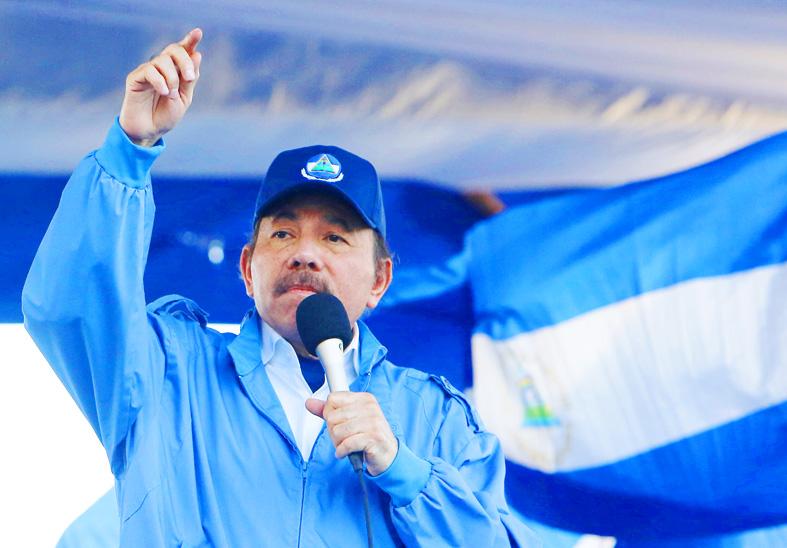Nicaragua’s sudden diplomatic switch from Taiwan to China was part of efforts by Nicaraguan President Daniel Ortega’s government to protect itself from recent international sanctions against Managua, a senior US administration official said on Friday.
China and Nicaragua on Friday re-established diplomatic ties after the Central American country broke relations with Taiwan, boosting Beijing in a part of the world long considered the US’ backyard, and angering Washington.
Nicaragua’s abrupt break with Taiwan followed months of worsening ties between Ortega and US President Joe Biden’s administration.

Photo: AP
Washington has imposed new targeted sanctions on Nicaraguan officials following the country’s elections last month.
Biden called the elections a “pantomime” that was neither free nor fair as Ortega, a former Marxist guerrilla and Cold War adversary of the US, won a fourth consecutive term.
The US official, speaking on condition of anonymity, said Nicaragua’s embrace of China was part of Ortega’s effort to consolidate his “authoritarian regime,” describing it as a response to sanctions by Washington and several other countries.
Washington viewed Nicaragua’s diplomatic switch as partly in response to such pressure from the international community, the official said.
“They have felt that pressure and perhaps need the PRC [People’s Republic of China] support, or think they need the PRC support, for their way forward as they hunker down in a more authoritarian posture,” the official said.
Nicaragua’s switch was a very “specific” case, the official said, adding that the US does not believe other such moves are imminent in the hemisphere.
US Department of State spokesman Ned Price late on Thursday said that Ortega does not have a democratic mandate to break ties with Taiwan as he only wields power due to the “sham” Nov. 7 presidential elections.
Ortega’s government arrested seven presidential candidates ahead of the poll.
After Nicaragua’s move, the top adviser to Paraguay’s president said that the South American country remains resolute about maintaining diplomatic relations with Taiwan.
“It is a decision of the Nicaraguan government. We respect it, but Paraguay remains firm in its position to continue diplomatic relations with Taiwan,” Federico Gonzalez, adviser to Paraguayan President Mario Abdo Benitez, said in a statement.
“For Paraguay this doesn’t change anything. Our position remains the same,” Gonzalez said.
Paraguay is now the only South American nation that maintains ties with Taiwan, a relationship that has been going on for more than six decades.
Taiwan finances various infrastructure projects and agricultural support projects in the country, and donated medical supplies at the start of the COVID-19 pandemic.

ROLLER-COASTER RIDE: More than five earthquakes ranging from magnitude 4.4 to 5.5 on the Richter scale shook eastern Taiwan in rapid succession yesterday afternoon Back-to-back weather fronts are forecast to hit Taiwan this week, resulting in rain across the nation in the coming days, the Central Weather Administration said yesterday, as it also warned residents in mountainous regions to be wary of landslides and rockfalls. As the first front approached, sporadic rainfall began in central and northern parts of Taiwan yesterday, the agency said, adding that rain is forecast to intensify in those regions today, while brief showers would also affect other parts of the nation. A second weather system is forecast to arrive on Thursday, bringing additional rain to the whole nation until Sunday, it

CONDITIONAL: The PRC imposes secret requirements that the funding it provides cannot be spent in states with diplomatic relations with Taiwan, Emma Reilly said China has been bribing UN officials to obtain “special benefits” and to block funding from countries that have diplomatic ties with Taiwan, a former UN employee told the British House of Commons on Tuesday. At a House of Commons Foreign Affairs Committee hearing into “international relations within the multilateral system,” former Office of the UN High Commissioner for Human Rights (OHCHR) employee Emma Reilly said in a written statement that “Beijing paid bribes to the two successive Presidents of the [UN] General Assembly” during the two-year negotiation of the Sustainable Development Goals. Another way China exercises influence within the UN Secretariat is

LANDSLIDES POSSIBLE: The agency advised the public to avoid visiting mountainous regions due to more expected aftershocks and rainfall from a series of weather fronts A series of earthquakes over the past few days were likely aftershocks of the April 3 earthquake in Hualien County, with further aftershocks to be expected for up to a year, the Central Weather Administration (CWA) said yesterday. Based on the nation’s experience after the quake on Sept. 21, 1999, more aftershocks are possible over the next six months to a year, the agency said. A total of 103 earthquakes of magnitude 4 on the local magnitude scale or higher hit Hualien County from 5:08pm on Monday to 10:27am yesterday, with 27 of them exceeding magnitude 5. They included two, of magnitude

Taiwan’s first drag queen to compete on the internationally acclaimed RuPaul’s Drag Race, Nymphia Wind (妮妃雅), was on Friday crowned the “Next Drag Superstar.” Dressed in a sparkling banana dress, Nymphia Wind swept onto the stage for the final, and stole the show. “Taiwan this is for you,” she said right after show host RuPaul announced her as the winner. “To those who feel like they don’t belong, just remember to live fearlessly and to live their truth,” she said on stage. One of the frontrunners for the past 15 episodes, the 28-year-old breezed through to the final after weeks of showcasing her unique